- Home
- Charlaine Harris
An Easy Death Page 7
An Easy Death Read online
Page 7
“You better?” she said. “I made some soup while you slept. Chrissie went to the store for me. If you can get to the bathroom on your own, I need to be getting home.”
“I can,” I said. To prove it, I sat up. And though it was in doubt for a moment, I didn’t pass out. Another head injury, not good. But—I thought for the second time—I felt better than I had any right to feel.
I made myself look at Mom steadily. If I winced or closed my eyes, she would feel worse about leaving me, and she’d spent enough time here. If the sky outside the window wasn’t lying, it was close to evening. I’d lost most of a day, drifting in and out of sleep.
And now that Mom had mentioned the bathroom, I needed to go bad. I got up, none too steady, and shuffled into the little room. I didn’t shut the door. If I did, and I passed out, she wouldn’t be able to get in because my body would hold the door shut.
While I was taking care of myself, Mom said, “The grigoris went back to the Antelope. They said they’d come back tomorrow. You get Chrissie to come for me if you can’t manage.” She looked like she’d say something more, but then she didn’t.
“I will, Mom.” Chrissie would get paid, as she’d already been paid for her trip to the store. She needed whatever cash she could bring in. I made my mouth turn up in a smile, so Mom could leave with a clear conscience. My mother looked at me doubtfully. I could tell she was torn. I gave her a nod, to let her know I was fine. After a moment’s hesitation, she patted my hand and left.
Sure enough, there was a pot of something simmering on the stove, and she’d put a bowl ready on the table for me, spoon next to it, biscuits in the pan set beside the bowl. The smell got my feet moving. I was determined I wouldn’t lie down again until I’d eaten. I swore only a time or two getting across the room to fill the bowl from the pot.
As soon as I sat down with the soup in front of me, and breathed the smell of it, I knew this was what I should be eating. My mom is a very good cook, and she knows how to season. This soup had chicken in it, and vegetables, and dumplings. The biscuits were bites of heaven. I tried to eat slowly, and with every bite I felt stronger.
When I’d broken up with a boyfriend, my first—he thought I’d neglected him, and I guess he was right—I’d asked Mom how she’d stayed with Jackson so long. She’d said, “From my side, this is how it looks. Jackson would stand by me if I poisoned his best friend. He never cheats. He works hard, he’s a great provider. Just as important, he’s been real good to you. That’s my side. And from his side, best I can tell . . . he knows I’m loyal and I won’t gossip about his doings, the sex is great, and the cooking is even better. Having both in your own home is damn near perfect.” She’d grinned at me like a girl.
So this was why I was not put out that she needed to go home to be with Jackson. I was glad she had someone who put her first.
It was pure pleasure to finish the soup slowly. I felt like a new person when I’d eaten the bowlful. I took the dishes to the sink, washed ’em up, put ’em in the drainer, smothered the little fire in the stove. I’d have to finish the soup tomorrow. I didn’t have a refrigerator. Hardly anyone did, especially on the hill.
I gave myself permission to go back to bed.
The next morning I was brave enough to look at my reflection. I’d chanced on an intact mirror in an abandoned house where we camped on one of our jobs. I’d brought it home to hang in my bathroom. The electricity was on today, so I pulled the chain. The exposed bulb made everything in my bathroom glaringly clear. I took a deep breath before I turned to have a look.
It would have been better if the power had been off.
I’d been hurt worse since I started work. But I had to wince at the sight in the mirror. I looked exactly like someone who’d been shot in the head. I took off the little bandage real carefully in order to clean the wound. I said, “Ew,” from somewhere deep inside me. There was a raw furrow on the left side of my scalp. It had been stitched together real precise. I was kind of surprised at the skill of it. Had my mother done that? She’d said something about it, but I couldn’t remember what.
Once I’d gotten used to the ugliness of the scalp wound, I moved on down to notice that the left side of my face was swollen and bruised. No surprise there.
After I had looked at myself enough, I told myself some hard truths. The Tatar’s bullet could have taken off my ear—or the top of my head.
It hadn’t. I should be grateful instead of dismayed.
Mom had cleaned my wound and put some thick, pink ointment on it, closed it with a sticky bandage that covered the stitches. I’d had to take the bandage off when I washed.
I leaned closer to the mirror and eyed the stitches. I was convinced Mom could never have done so neat a job. Sure of that now, I had to wonder about the bandage. It was purpose-made, not a rag with sap applied. There were clean ones waiting to be put on.
The grigoris had taken care of me.
I was sure the bandager had been the man, Eli. I didn’t like the thought of him touching me, but somehow it was better than when I imagined the woman’s fingers doing the job.
Shit. Now I owed them.
As if thinking about the grigoris had conjured their appearance, I could hear ’em coming up. They knocked soft and polite.
“Come in,” I said, but I had my gun trained on the opening door, because all of a sudden I was angry. As soon as Eli saw me, he froze. Which was smart.
“I thought your mother might still be here,” he said, trying to sound relaxed.
“No.”
“Can we come in?”
“You alone?”
“Paulina and I,” he said.
“Nobody followed you this time?”
“No.” Eli sounded guilty and a little angry.
“Okay then.”
Eli stood back to let Paulina precede him. They sat on the bench on the other side of the table, as before. Paulina looked . . . nothing. Her face was blank. I waited for one of them to open the conversation.
“We’d been here for a week without seeing him. We figured he’d given up,” Eli said, by way of explaining.
“He likely to have anyone following him? Did Josip have a partner?”
“As far as we know, Josip the Tatar always worked by himself,” said Paulina. She looked down at her hands. “That was a quick decision you made, to shoot. How’d you know he was an enemy?”
“Your enemy,” I said, wanting us to be clear about that. “Around here, friends knock. Specially when they can hear you’ve already got company.”
Her eyes kept returning again and again to the wound in my head. “Does it hurt?” she asked, and you could tell she’d been dying to ask.
“What the hell do you think?” Of course it hurts, bitch. Get shot in the head and see how you feel.
“We stopped in to see how you were,” Eli said. “And to ask again if you’d work for us while we search for Oleg Karkarov’s brother.”
“And his name would be?”
“Sergei.”
Of course. It would have to be either Sergei or Dmitri. Those seemed to be the most popular names in the Holy Russian Empire.
“And what do you need him for?”
They glanced at each other. Eli said, “As we said, we need his blood.”
“On the ground? In a cup? Over an altar?” There were all kinds of religions popping up now. The old church had been half-broken in the Great Depression, when people had discovered faith would not save them from poverty and starvation. There were plenty of believers left, especially in Mexico. I’d heard there was a different kind of Christianity in the HRE.
Eli said, “No, we need him alive, so we can . . .”
Paulina scowled at Eli. He shut up. They sure did take turns hushing each other.
I thought of asking, What’s wrong with the tsar? But then they’d have to kill me . . . at least, they’d have to try. I felt pretty safe. The grigoris would never believe I could think it through. Here was my reasoning: It was expensiv
e to send two grigoris traveling outside the HRE, to search for a man they didn’t know was alive or dead. If the grigoris, finding Oleg dead, needed this Sergei alive for his blood . . . the only person I knew of who was both rich and afflicted with a blood disease was the Holy Russian tsar, Alexei I.
Even for a lowly gunnie like me, that was not so hard to figure out.
I didn’t have any notion what Sergei’s blood could do to help the tsar—but if the grigoris were involved, there was a magic ritual or some such shit.
My head began to throb with all this thinking. I wanted to sleep again.
“Does it make any difference what we need the man for, if we pay you to help us?” Eli asked.
That was a question I could answer, though I didn’t have to tell the truth. “No,” I said. “How long you need me for? How much you offering?”
“Considering we’re not tearing you away from anything else,” Paulina said with some quiet sarcasm, “here’s what we’ll pay per week.” She named a price. In Holy Russian currency. That would convert to Texoman/New American bucks with an advantage for me.
The sum was enough to keep me for two months. If I lived to spend it. I had money at the moment, but I wasn’t going to keep all of it. And I needed a stash. Hard times were always around the corner.
“As for how long,” Eli said, “we’ll keep searching until we decide we’re not going to find him . . . or until we’ve got him.”
“Minimum of three weeks, guaranteed.” After all, if I was guarding and guiding them full-time, I couldn’t be looking for another job, a permanent job, which was what I needed.
“Ridiculous,” Paulina said.
I liked her not at all.
“I’ve already saved you from getting shot in the back. For nothing.” I smiled at the grigoris, and not in a nice way. “Not even a thank-you.”
Eli’s mouth dropped open, and I could tell he was casting his mind back over the conversation and coming up with zero. Zilch. Nada. I raised my eyebrows, as if to say, Right.
He was mortified, but too proud to say so. She was too proud to even acknowledge their debt.
“You saved your own life,” she pointed out, raising her nose in the air.
“Oh, you think he would have opened my door and shot at me if you hadn’t been sitting there?” Josip had aimed at me only when I’d stood and offered to fight back.
Paulina shut up then. After a long moment Eli said, “Thank you, Gunnie.” It was stiff but pretty sincere.
“You’re welcome, wizard. And thank you for taking care of my head. Good stitching. And I guess you had something to do with me feeling not as bad as I thought I’d feel.” I didn’t know how he’d done it, or how they’d done it, but I had to acknowledge their help.
After all, might as well be polite. They’d at least disposed of Josip’s body, which was something. I started to ask what had happened to it, but then I realized I really didn’t care.
“Where do you want to start looking for this mysterious brother?” I said. I could tell it hadn’t escaped their notice that I hadn’t said yes or no. I wanted to learn as much as I could. I figured that first on their agenda would be a trip to Cactus Flats, where Oleg Karkarov had been shot. (His death had been in the regional newspaper, which came out every week. It hadn’t been any big secret. The grigoris couldn’t be surprised I knew about it.)
“We should go to the place where Oleg died,” Eli said. “Are the roads to Cactus Flats any good?”
“No,” I said truthfully. “Best way to get there is by horseback. Do you both ride?”
“Yes, of course,” said Paulina, looking down her nose. “How long will it take?”
“It will be a day trip,” I said. “If we get started early in the morning, we might be back here by midafternoon. Depending on what we find out, of course.”
“We’ll set out first thing in the morning,” she told me. “Meet us at the stable.” Without more conversation, Eli and Paulina left. Eli did tell me good-bye; Paulina kept her good-byes to herself.
Since I had the rest of the afternoon on my own, I paid the visits I had to pay. Though my head ached, I could walk and talk, and I should not put them off. If I was going somewhere with the grigoris, I might not come back.
I went to Freedom’s little house when I figured he’d gotten off work. I gave him half Galilee’s portion of the money, and I offered him her Krag. He gave me a hug, took the money, declined the rifle, but was glad to take the bandit pistol I’d cleaned.
“I know you loved her,” Freedom said. I nodded. I wasn’t going to cry anymore, but that was a hard resolve to keep. It helped that a stranger was there. She turned out to be Freedom’s girlfriend, a shy and pretty youngster I’d never met. I could see she was pregnant. Freedom told me, “If it’s a girl, we’ll name her Galilee.”
Next I walked back into the older part of town for the visit I was dreading even more, but for different reasons.
Leisel, mother of Tarken’s son, disliked me quite a bit. She and Tarken had been living apart for the past three years at least. I knew Tarken had had other women before he and I had begun being together, but I seemed to be the one Leisel objected to. No matter how Leisel felt about me, Tarken had been a good father, and I had to honor that by visiting his son.
“Well, it’s you,” Leisel said when she opened the door. “I didn’t know if you’d come by.” She was a tiny woman with red hair and a strong right hook, as I’d discovered when she’d come by Tarken’s while I was there one night.
This evening there was no fire in Leisel. James Lee, who was twelve, and small like his mother and father, was deep in a shadow of grieving. He glowered at me.
“Why did my father count on you to protect him?” James Lee said, his voice all jagged with emotion. He was a quiet boy. He had always treated me with respect when he’d been with Tarken. Not anymore.
“Because I’m one of the best shots there is,” I said. “But there were too many of them firing at us. I was the only one left. And I tracked them down and killed them all.” That was all I had to offer the kid. James Lee ran outside and let the screen door slam behind him.
I thought about going after him, but Leisel said, “He needs some time. He’s a brooder. He’ll see it straight, sooner or later.”
I gave Leisel Tarken’s whole portion, for James Lee. That wasn’t the normal thing to do, any more than giving Freedom some of Galilee’s share. No one would have said anything if I’d kept it all. But I figured Tarken would have liked me doing that. I knew now that we hadn’t been in love, but I’d cared about him something ferocious.
I had nothing more to talk to Leisel about. She did know where Tarken had been buried, but I didn’t think I’d go to the cemetery, at least not yet. He wasn’t there, to me.
Martin’s wife and his daughter had been killed by a Mexican raiding party years ago. His brother, Thomas, wasn’t entitled. I felt free to keep Martin’s fourth, and I was glad to be spared another visit.
Early the next morning I took most of my money to my mother’s. No one would dare to break into Jackson Skidder’s home. Mom was at the school and Jackson was at one of his businesses, so I hid the money in a place I’d made in the wall behind the bed in the room I’d had growing up. Mom knew to check it if something happened to me.
I left her a bag of oranges smuggled in from southern Dixie. Army had acquired the bag (I didn’t ask any questions how he’d done that), and I’d bought it before anyone else could. Mom would divide some of the oranges among the kids at school, but maybe she and Jackson would have one apiece. I left a note to tell her I was guarding the grigoris and where we were heading. If I didn’t come back, Jackson might track them down. Maybe.
But if they got the better of me, they deserved to live.
I had assembled what I needed, a task that had taken me less than five minutes. If we were going to Cactus Flats, we wouldn’t be there long. I liked riding a horse, and I liked going slow enough to see the land, but the trip would have
been really interesting if the road there had been good enough for a car. Evidently, the grigoris had one. Though I’d been in a truck many a time, I’d ridden on a train once and in a car once. Those had been real events.
According to my grandmother, when this big space had been one country, a lot of families had had their own cars.
Tarken and Martin had saved for the truck, bought it piece by piece, searched junkyards, found old manuals, and put the truck together from old parts, new-fashioned ones, and imagination. Our crew’s truck had been part Ford one-and-a-half-ton, part Kenworth, Martin had said.
I remembered the hours they’d spent building the truck, how proud they’d been. When I remembered what it looked like the morning after the ambush, I got angry all over again. There was a practical reason I regretted the loss of the truck, too. If it hadn’t wrecked, I could have sold it for almost enough money to retire. Or I could have started my own crew, an idea both scary and exciting.
Right at this moment shade-tree mechanics all around Segundo Mexia were combining pieces of our crew’s truck with their own vehicles. Eventually, most of our truck would hit the road again.
I was okay with that. Bodies could be claimed, but vehicles were fair game if no survivors were on the spot.
Long way around to say that when I met the grigoris in front of the stable, they were talking with John Seahorse, the owner. They were asking John to recommend the three horses least likely to give us trouble. I learned from their conversation that the grigoris had left their car in an unused room at the stable.
We set off at eight thirty or thereabouts, riding Briar, Star, and Birdie. We weren’t carrying much besides ourselves—I’d brought a little emergency food, my guns (of course), and a canteen full of water, and Paulina and Eli had canteens only. The weather was clear and bright, the sky cloudless, and the talk . . . well, we didn’t, besides a comment or two from Eli about some feature of the landscape from time to time. We reached the scraggly outskirts of Cactus Flats about two hours before noon.

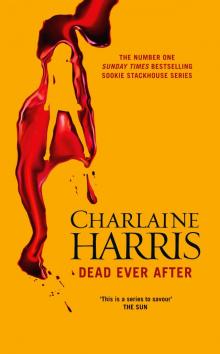 Dead Ever After
Dead Ever After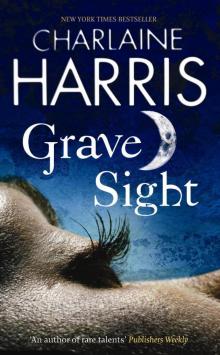 Grave Sight
Grave Sight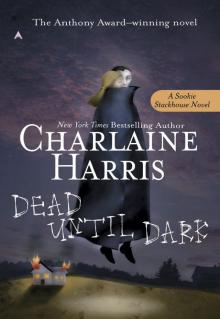 Dead Until Dark
Dead Until Dark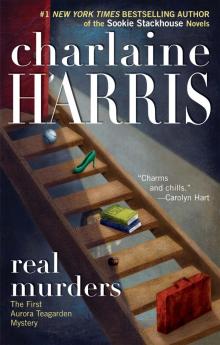 Real Murders
Real Murders Wolfsbane and Mistletoe
Wolfsbane and Mistletoe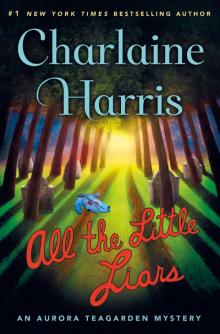 All the Little Liars
All the Little Liars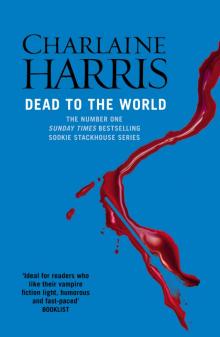 Dead to the World
Dead to the World Club Dead
Club Dead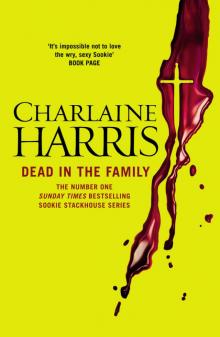 Dead in the Family
Dead in the Family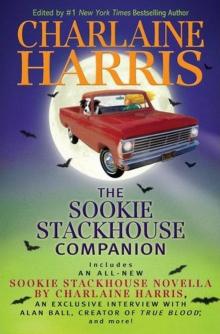 The Sookie Stackhouse Companion
The Sookie Stackhouse Companion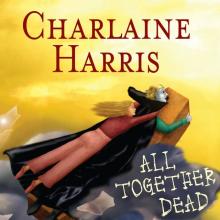 All Together Dead
All Together Dead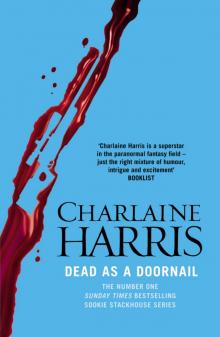 Dead as a Doornail
Dead as a Doornail Sleep Like a Baby
Sleep Like a Baby Night Shift
Night Shift A Touch of Dead
A Touch of Dead Living Dead in Dallas
Living Dead in Dallas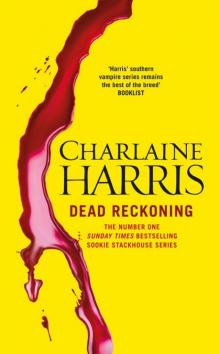 Dead Reckoning
Dead Reckoning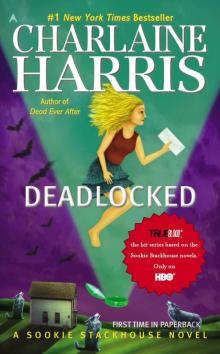 Deadlocked
Deadlocked Dead and Gone
Dead and Gone From Dead to Worse
From Dead to Worse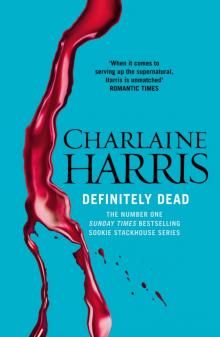 Definitely Dead
Definitely Dead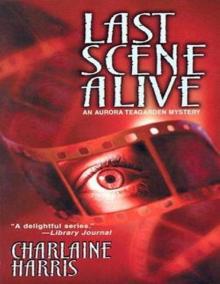 Last Scene Alive
Last Scene Alive Grave Secret
Grave Secret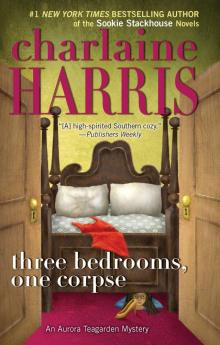 Three Bedrooms, One Corpse
Three Bedrooms, One Corpse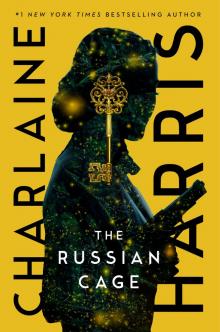 The Russian Cage
The Russian Cage Shakespeares Counselor
Shakespeares Counselor Dead of Night
Dead of Night Shakespeares Trollop
Shakespeares Trollop One Word Answer
One Word Answer Shakespeares Champion
Shakespeares Champion Shakespeares Christmas
Shakespeares Christmas Shakespeares Landlord
Shakespeares Landlord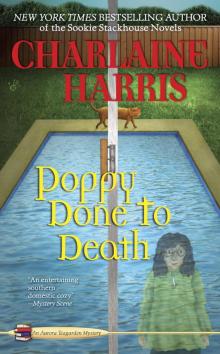 Poppy Done to Death
Poppy Done to Death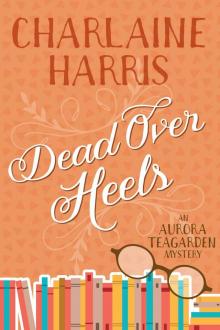 Dead Over Heels
Dead Over Heels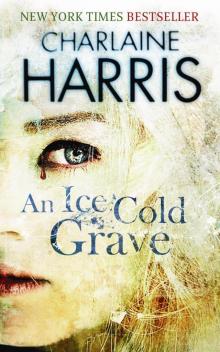 An Ice Cold Grave
An Ice Cold Grave The Julius House
The Julius House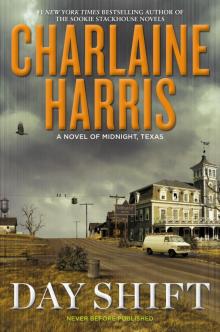 Day Shift
Day Shift A Fool And His Honey
A Fool And His Honey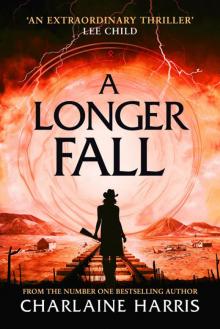 A Longer Fall (Gunnie Rose)
A Longer Fall (Gunnie Rose) The Complete Sookie Stackhouse Stories (Sookie Stackhouse/True Blood)
The Complete Sookie Stackhouse Stories (Sookie Stackhouse/True Blood)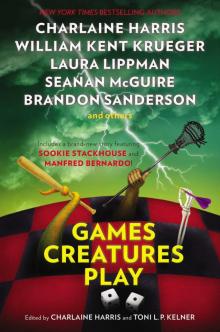 Games Creatures Play
Games Creatures Play Death's Excellent Vacation
Death's Excellent Vacation (LB2) Shakespeare's Landlord
(LB2) Shakespeare's Landlord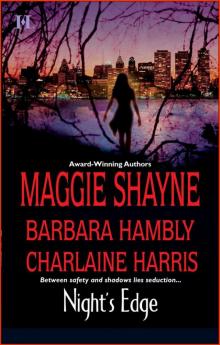 Dancers In The Dark - Night's Edge
Dancers In The Dark - Night's Edge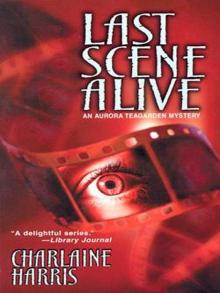 Last Scene Alive at-7
Last Scene Alive at-7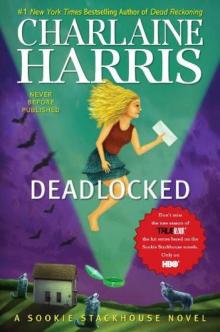 Deadlocked: A Sookie Stackhouse Novel
Deadlocked: A Sookie Stackhouse Novel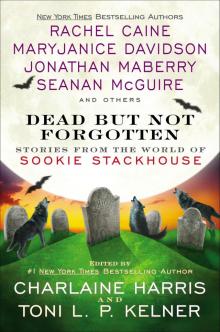 Dead But Not Forgotten
Dead But Not Forgotten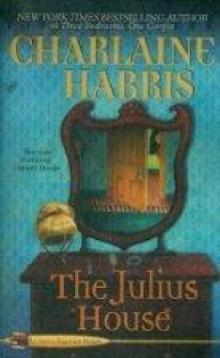 (4/10) The Julius House
(4/10) The Julius House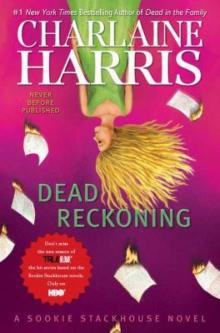 Dead Reckoning: A Sookie Stackhouse Novel
Dead Reckoning: A Sookie Stackhouse Novel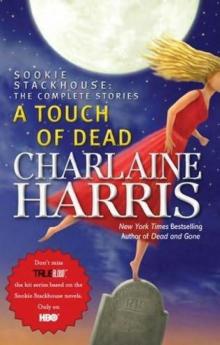 A Touch of Dead (sookie stackhouse (southern vampire))
A Touch of Dead (sookie stackhouse (southern vampire))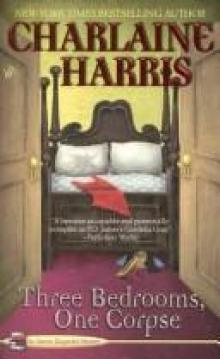 (3T)Three Bedrooms, One Corpse
(3T)Three Bedrooms, One Corpse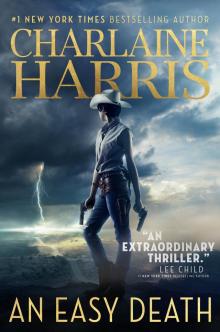 An Easy Death
An Easy Death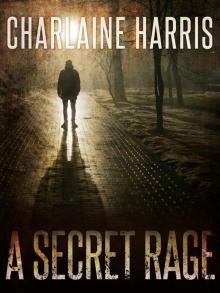 A Secret Rage
A Secret Rage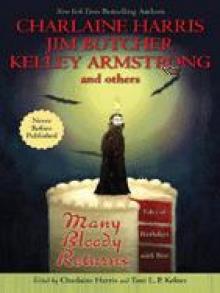 Many Bloody Returns
Many Bloody Returns![Harper Connelly [3] An Ice Cold Grave Read online](http://i1.bookreadfree.com/i/03/25/harper_connelly_3_an_ice_cold_grave_preview.jpg) Harper Connelly [3] An Ice Cold Grave
Harper Connelly [3] An Ice Cold Grave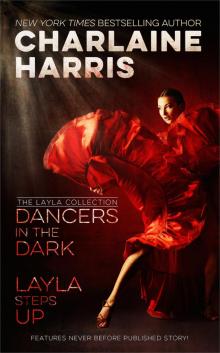 Dancers in the Dark and Layla Steps Up
Dancers in the Dark and Layla Steps Up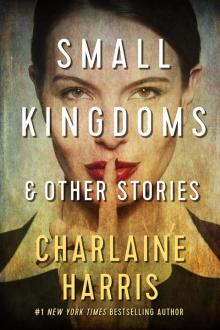 Small Kingdoms and Other Stories
Small Kingdoms and Other Stories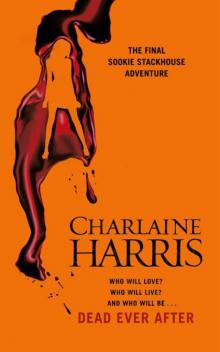 Dead Ever After: A Sookie Stackhouse Novel
Dead Ever After: A Sookie Stackhouse Novel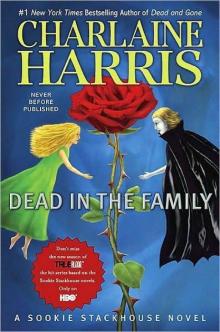 Dead in the Family ss-10
Dead in the Family ss-10 Sweet and Deadly aka Dead Dog
Sweet and Deadly aka Dead Dog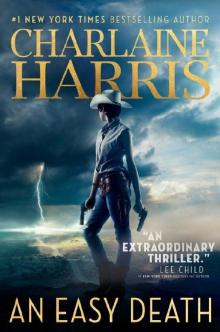 An Easy Death (Gunnie Rose #1)
An Easy Death (Gunnie Rose #1) The Complete Sookie Stackhouse Stories
The Complete Sookie Stackhouse Stories Sookie Stackhouse 8-copy Boxed Set
Sookie Stackhouse 8-copy Boxed Set Sweet and Deadly
Sweet and Deadly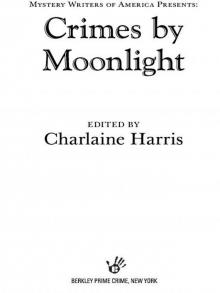 Crimes by Moonlight
Crimes by Moonlight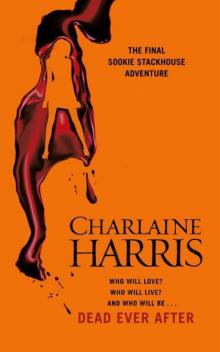 Dead Ever After: A True Blood Novel
Dead Ever After: A True Blood Novel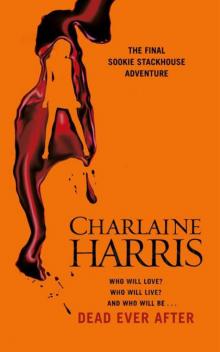 Dead Ever After ss-13
Dead Ever After ss-13 After Dead
After Dead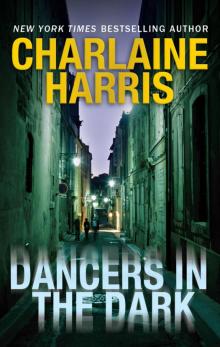 Dancers in the Dark
Dancers in the Dark (LB1) Shakespeare's Champion
(LB1) Shakespeare's Champion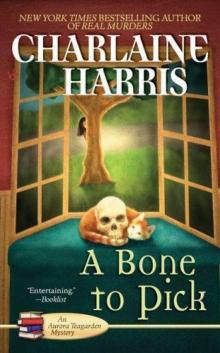 A Bone to Pick (Teagarden Mysteries,2)
A Bone to Pick (Teagarden Mysteries,2)